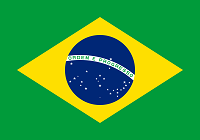Ordem e Progresso
Like many countries of the New World, Brazil's modern brewing traditions were introduced with the influx of European immigrants. While many parts of the world including South America have thousands of years of primitive brewing history, it was the Germans who originally brought over the modern styles of beer that are still vastly preferred among the Brazilian population. It is held that early Brazilian German immigrants began starting up their own breweries in the 1830s, though the Bohemia brand claims to have been the first Brazilian beer produced, near Rio. In actuality, Bohemia is the oldest continuously operating brewery, though it is currently under control of AB InBev, which held a 70% market share in 2009. Many of the country's breweries have been acquired by or merged with larger international firms looking to expand into the Brazilian economy, which was expanding at a massive rate in the early parts of the new millenium. Brazil's second largest brewery Cervejaria Kaiser was purchased by Molson Coors in 2002, and then by a large South American holding company FEMSA in 2006. AB InBev owns many regional brands, including many of Brazil's oldest and largest breweries. Grupo Schincariol, formerly the largest Brazilian owned brewery before 2011, is a part of the Japanese owned Kirin Brewery, who, after merging with Schincariol, is now known as Brazil Kirin. Heineken International also has controlling interests in various Brazilian brands, and commanded a 6.9% market share in 2009. Today, Brazil boasts the third largest beer market in the world with over 13.2 billion liters produced annually. Pilsner beer is far and away the most popular style consumed, holding 98% of the Brazilian market share. While the market share of Brazil's brewing industry has shifted toward more of a foreign owned oligopoly, many new, yet sparsely distributed microbreweries have been established in recent years. In addition to small scale operations, Brazil has also been importing a larger proportion of its beer, particularly from The United States and Belgium. Though imports are much more expensive than locally sourced beverages, many bars and alcohol retailers are opting for a large beer selection in an effort to increase sales. In 2012, Brazil ranked 24th in the world with 68.3 liters of beer consumed per capita annually, but third in the world with 1,280,000,000 liters consumed in total.Rated Brazilian Beers
12-16-14 - Cervejaria Kaiser Xingu Black Beer - 2.53, Schwarzbier, 4.70%
 The Beer List -
The Beer List -




